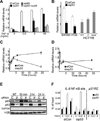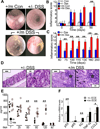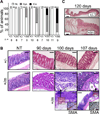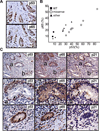Mutant p53 prolongs NF-κB activation and promotes chronic inflammation and inflammation-associated colorectal cancer
- PMID: 23680148
- PMCID: PMC3657134
- DOI: 10.1016/j.ccr.2013.03.022
Mutant p53 prolongs NF-κB activation and promotes chronic inflammation and inflammation-associated colorectal cancer
Erratum in
- Cancer Cell. 2013 Aug 12;24(2):272. Rozenfeld, Nitzan [corrected to Rosenfeld, Nitzan]
Abstract
The tumor suppressor p53 is frequently mutated in human cancer. Common mutant p53 (mutp53) isoforms can actively promote cancer through gain-of-function (GOF) mechanisms. We report that mutp53 prolongs TNF-α-induced NF-κB activation in cultured cells and intestinal organoid cultures. Remarkably, when exposed to dextran sulfate sodium, mice harboring a germline p53 mutation develop severe chronic inflammation and persistent tissue damage, and are highly prone to inflammation-associated colon cancer. This mutp53 GOF is manifested by rapid onset of flat dysplastic lesions that progress to invasive carcinoma with mutp53 accumulation and augmented NF-κB activation, faithfully recapitulating features frequently observed in human colitis-associated colorectal cancer (CAC). These findings might explain the early appearance of p53 mutations in human CAC.
Copyright © 2013 Elsevier Inc. All rights reserved.
Figures








References
-
- Ak P, Levine AJ. p53 and NF-kappaB: different strategies for responding to stress lead to a functional antagonism. FASEB J. 2010;24:3643–3652. - PubMed
-
- Becker C, Fantini MC, Neurath MF. High resolution colonoscopy in live mice. Nat Protoc. 2006;1:2900–2904. - PubMed
-
- Ben-Neriah Y, Karin M. Inflammation meets cancer, with NF-kappaB as the matchmaker. Nat Immunol. 2011;12:715–723. - PubMed
Publication types
MeSH terms
Substances
Associated data
- Actions
Grants and funding
LinkOut - more resources
Full Text Sources
Other Literature Sources
Medical
Molecular Biology Databases
Research Materials
Miscellaneous

